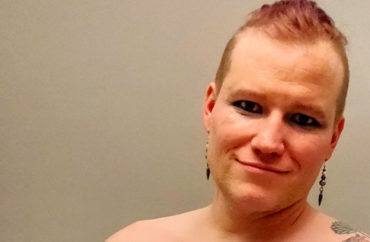
In just two weeks, the University of Massachusetts Amherst College of Nursing will host a “health ethicist and health humanities scholar” who will speak about how American healthcare is “centered within the oppressions of whiteness.”
With “Listening outside of whiteness: Make our bodies matter,” the University of Illinois at Chicago’s Em Rabelais claims that “we in these institutional spaces have been told for centuries—by Black, Indigenous, and other people of color, as well by the disabled, queer and trans* folx, and others—that health and healthcare is a contested political state, centered within […] white supremacy.”
Indeed, Rabelais’s main academic focus is “decentering whiteness,” according to her faculty page. (Dr. Rabelais actually uses “they/themself” pronouns, but for grammar’s sake we’ll keep it simple.) Here’s how this “decentering” is put into use:
Dr. Rabelais’s distinct ethics prioritizes critical resistance and identity-focused narrative approaches to purposefully center patient, community, and student narrative voices as the definers of whiteness’s oppressions in order to initiate dismantling the transmission of learned, enacted centered whiteness in these settings.
If that comes off as a bit, well, nebulous, perhaps this can help clarify:
Narrative ethics can make apparent actors’ positionalities within structural racism, white supremacy, and professionalisms while simultaneously identifying possibilities to re-create space, practice, and education as defined by those who are demanding the change.
Still lost? Let’s go to the UMass Amherst event description for further, er, clarification:
Grounded in listening to, reflecting upon, and believing Black feminist and intersectional discourse, I call for us to engage and disrupt the whiteness-in-us. Quite often our students, always for our patients, and sometimes we as educators and clinicians, know where whiteness resides and how it works, yet our integrations of which knowledges are normal/acceptable continue to manifest the centering of whiteness in the classroom and clinic. Students’ and patients’ impassioned pleas against whiteness are part of our daily realities and share a rhetorical goal with the artistic expressions of spoken word poetry. Spoken word is an oppositional art intended for performance and frequently embodies issues such as social and racial justice, the personal as political, and responses to normative whiteness’s (mis)understandings of the body.
Rabelais, who identifies as “anti-socialite, trans, queer, [and] disabled” on Facebook, has been (and will continue to be) busy with speaking engagements. Coming 2020 events include:
— “Our whiteness is unethical: Disrupt ‘diversity and inclusion’ to decenter whiteness” (Minnesota)
— “Spoken word poetry and politicized space-taking: Confronting ableism and racism through oppositional art in the classroom (Tennessee)
— “Listening and acting outside of whiteness: Necessary communication” (Illinois).
Last year, the ethicist gave the talks “Diversity and inclusion are not strategies: Decentering whiteness in nursing” and “Narratives of the other in dominant social consciousness: Radical redefinitions of experience in the everyday.”
Read the full event description.
MORE: Psychoanalyst: Whiteness is ‘voracious, perverse parasitic-like condition’
MORE: Pro-diversity academics: The sciences have a problem with ‘whiteness’
IMAGE: Twitter screenshot
Like The College Fix on Facebook / Follow us on Twitter





Please join the conversation about our stories on Facebook, Twitter, Instagram, Reddit, MeWe, Rumble, Gab, Minds and Gettr.